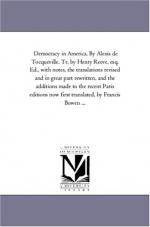|
This section contains 167 words (approx. 1 page at 300 words per page) |
Dictionary of Literary Biography on Francis Bowen
Francis Bowen educator and philosopher, was born in Charlestown and brought up in the best Massachusetts fashion: after attending Phillips Exeter Academy, he went to Harvard College, graduating in 1833. Following brief stints teaching at Exeter and Harvard, Bowen travelled to Europe in 1839. Upon his return, he settled in Cambridge, Massachusetts, where he began writing books and edited, for ten years, the North American Review. In 1853 Harvard appointed him to a professorship that he held for thirty-six years. He died in Boston. Bowen wrote over fifteen books on subjects ranging from the Bible to the Hungarian Revolution, but is best known for his philosophical works, including Critical Essays on a Few Subjects Connected with the History and Present Condition of Speculative Philosophy (Boston: Williams, 1842), Principles of Political Economy (Boston: Little, Brown, 1856), and Modern Philosophy: From Descartes to Schopenhauer and Hartmann (New York: Scribner, Armstrong, 1877). He strongly supported a teleological argument that the existence of God may be inferred from the order and harmony of the universe.
|
This section contains 167 words (approx. 1 page at 300 words per page) |


